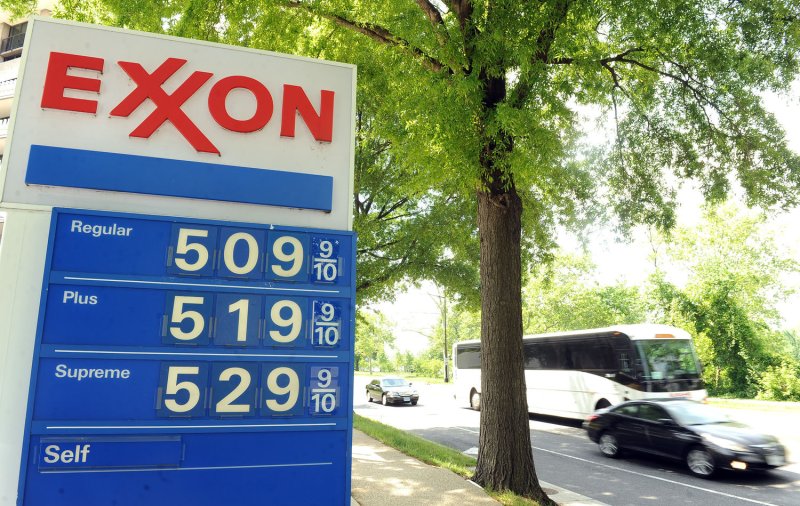Gas prices are listed at $5.09 9/10 for regular and $5.29 9/10 for premium at a station in Washington, D.C. UPI/Roger L. Wollenberg |
License Photo
PARIS, March 29 (UPI) -- Washington has asked Paris to join the United States and Britain in mulling tapping oil reserves to ease rising gasoline prices, France's energy minister said.
"It is the United States which has asked, and France has welcomed favorably this hypothesis," Eric Besson told reporters in Paris.
The Obama administration said it was considering a reserve release but had reached no decision.
"As we have said repeatedly, while this is an option that remains on the table, no decisions have been made and no specific actions have been proposed," White House Deputy Press Secretary Josh Earnest told reporters Wednesday.
"It should be no surprise to you that the Obama administration -- particularly folks at the State Department and others -- have been in contact with their counterparts to talk about trying to address this challenge [of rising oil prices]," he said.
The French newspaper Le Monde, which initially reported Paris' contact on the issue with Washington and London, said a possible release of strategic oil stocks, intended to lower fuel prices amid tensions with No. 4 oil supplier Iran, could happen "in a matter of weeks."
French budget minister and government spokeswoman Valerie Pecresse separately told reporters Paris was in talks with the International Energy Agency about tapping emergency oil stockpiles, joining the United States and Britain in pondering such a move.
The IEA, which represents the interests of industrialized oil consumers and coordinates strategic oil stocks held by its members, declined to comment.
British officials said two weeks ago President Barack Obama was evaluating tapping the U.S. Strategic Petroleum Reserve, coordinated with releases in Britain, to ease gas prices.
The timing and volume of any releases had not been agreed upon, but a detailed plan was expected by summer, the officials told the British newspaper The Guardian, after British Prime Minister David Cameron left Washington following meetings at the White House.
The British bank and financial services company Barclays PLC said last week in a note cited by The Wall Street Journal a U.S. "strategic stock release, either unilaterally or via the International Energy Agency, appears inevitable during the next two quarters."
The U.S. reserve, the world's largest emergency oil supply, had a reserve inventory of 695.9 million barrels as of Feb. 29, the latest date recorded, a United Press International review Wednesday night indicated.
This amount equates to 36 days of oil at current U.S. consumption levels of 19.5 million barrels a day.
Obama and French President Nicolas Sarkozy are both up for re-election this year and face pressure to respond to motorists irate over rising prices.
The average U.S. price for unleaded gasoline was $3.91 a gallon Wednesday, AAA reported. The average unleaded price in France was about $7.95 a gallon, UPI estimated, based on figures reported in Le Monde Thursday.
Obama and Sarkozy have spearheaded sanctions against Iran, because of its nuclear program, that have forced the country to cut its oil shipments.
Barclays warned a release could push prices higher.
"The U.S. drawdown of 30 million barrels [last year] has yet to be refilled," it said.
If the United States taps the reserve again, "additional demand to refill the [Strategic Petroleum Reserve] is not necessarily going to be price neutral."
Washington tapped 30 million barrels from the reserve last summer in an IEA member-state effort to offset oil supply disruptions caused by Arab Spring upheavals in Libya and elsewhere in North Africa and the Middle East.
The United States and other countries created reserve stockpiles in 1975 after oil supplies were cut off during a 1973-1974 oil embargo.










